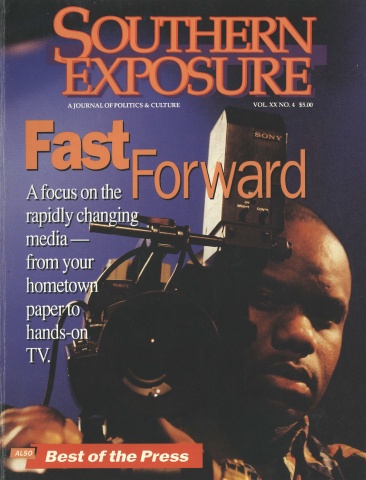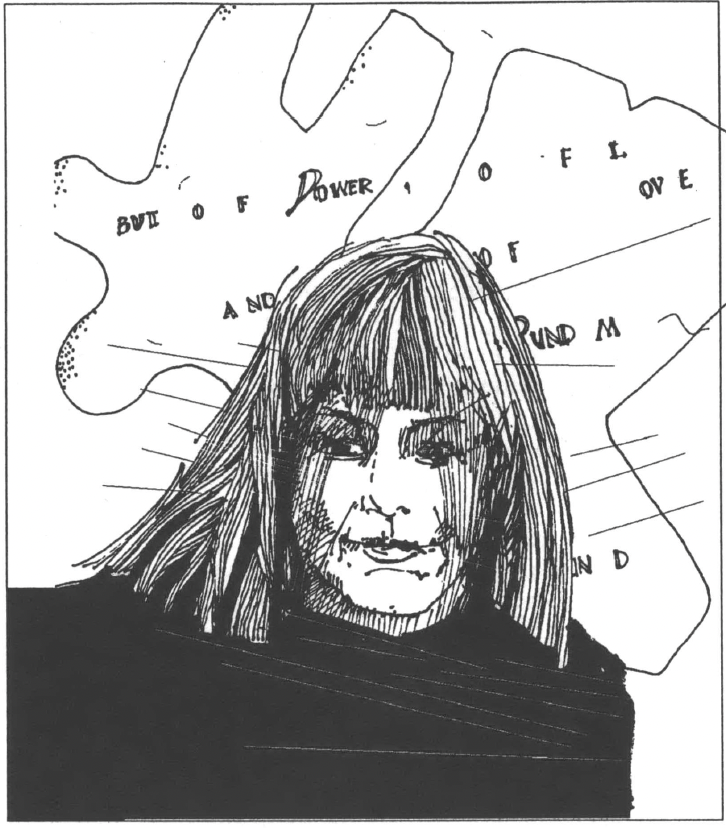
This article originally appeared in Southern Exposure Vol. 20 No. 4, "Fast Forward." Find more from that issue here.
In 1935 I was nine years old. For some reason, I can remember vividly the events of that year. This is strange to me because I cannot say today for certain what dress or what shoes I wore a week ago Monday. The brain is a funny thing. I remember the exact shade of red of my brother’s scarf, the way the same wisps of hair fell from my mother’s top-knot by the end of every day, the odor of my father’s suits, the feel of powdery snow against my face and fingers. I close my eyes and see the view from the end of Church Street where we lived, the ice-coated vista that I committed to memory while I waited like a sentinel for my father to return from his trip to Richmond. I remember the rhythm of scallops which crested the brick wall that surrounded Oak Ridge Academy like the long tail of a giant dragon in the distance. Oak Ridge was a mysterious place full of young boys and old white-haired men, and a black cook named Bertha who ordered groceries for “my boys,” as she called them.
That year I did something that upset my brother a great deal. Afterward, he yanked my wrist as he dragged me home from the mercantile, saying I was queer and had embarrassed him for the last time. He said he wished I would join a circus and leave the mountain to go live in the low country where no one else would know we were related. What I had done fairly tortured him, and he threatened to spit on me if I ever did it again.
That was also the year my father decided to expand his mercantile business to include a small department store with ready-made items like dresses and hats and fancy cigarette cases with engraving on the fronts. He even brought mannequins for the window, at first just a man and a little girl.
My mother didn’t approve of the ready-made merchandise. She said privately that she could have sewn more practical dresses, knitted sturdier socks, tatted more elegant lace. But her attitude came more from a fear of the unfamiliar than any standard of quality.
My brother was like her, judgmental, suspicious. But the good thing about them was that they had no envy. They were truly content with what they had and what they expected to have. In moments of soulful agony or simple frustration I used to think how lucky they were to be so content.
I loved my father more than my mother simply because he was so willing to launch into anything that might bring about change. My father and I were afraid of inertia. He once said to me, “You and I pale at the familiar, Mary, because we are afraid that’s all there will be.”
He carried a piece of paper in his wallet, a verse torn from a letter someone had written to him. The folds were creased to fragile cracks and worn brown by his fingers. He read the words out loud to me or silently to himself. A verse from the Bible, “For God hath not given us the spirit of fear; but of power, of love, and of a sound mind. ” II Timothy 1:7. I have it in a drawer. It was his shield.
Of course he had memorized the verse years before. And on that day he came back from Richmond, and had to hear my brother’s embellished fitful recounting of how I had lain down in the snow, he asked to be alone with me. My brother thought my father was going to spank me, so he smugly left the room.
When Father and I were alone he had me hold the fragile paper and read the Bible verse to him. Then he said, “It isn’t always enough to know important things. Sometimes you must touch them.”
I knew this. That is what had upset my brother. That is why my wrist was bruised. That was the very thing I had tried to do.
The thing I did came about as part of a normal day. My mother ran out of white thread for quilting, so she sent me to the mercantile for another spool. I was across the street from the store when I heard the boys from Oak Ridge coming, shuffling through the new snow to pick up their order of groceries. Six of them, happy and jolly with laughter puffing clouds from their mouths into the bracing air. They were a little younger than my brother, maybe fourteen. Some of them had hats and others earmuffs. Their faces were red from the cold. They wore drab gray coats and black gloves. They looked alike, ordinary, except for one boy who had red curly hair and freckles on his face, and a new boy with black hair and eyes as green as summer grass. I had seen the green-eyed boy three times before. I thought he was quite handsome. Once he had waved to me. That day he saw me he winked at me and then threw a handful of snow at one of his playmates.
I stopped.
The green-eyed boy was in the middle of the moving huddle, all of them coming down the street, one amorphous body with twelve legs and six heads. Then the green-eyed boy’s head lurched backward and his gloved hands drew toward his chest in a counting motion, one, two, three, faster, four, five. His knees buckled beneath him and he began to lean toward the snow.
His friends turned and helped him to the ground at the foot of the boardwalk, clear of the steps. They surrounded him, vigilant, warning people on the street to stand back.
“Don’t touch him!” one boy shouted to a woman who moved to comfort the boy on the ground.
“Don’t you touch him either, Mary!” my brother shouted. “You might catch something.” He stood in the doorway of the store with his white apron over his sweater. I knew he was there, what he looked like, the way his lips formed the words he yelled at me. But I didn’t see him. I couldn’t look away from the boy in the snow.
One of the Oak Ridge boys threw a stick at the shop door. “Be quiet, you idiot!” he shouted at my brother. My brother quickly closed the door. I heard it slam.
The green-eyed boy continued to move in short jerks, slicing his feet into the snow, his head back into his shoulders pulling to the left. His mouth was open and only crescents of his green eyes cupped beneath his half-closed lids.
I was transfixed. I had witnessed this thing from its beginning and I stood there watching, staring. I didn’t think about being rude, I didn’t think. I watched.
Within minutes, I don’t know how many, he stopped almost as quickly as he had started. His body slid limp and sprawling into the wet powdery snow and then was motionless, his eyes closed and his breathing labored. “You all right, Roddy?” the red-haired boy asked. The green-eyed boy nodded.
“Help him,” said a lady to her husband. “No,” said one of the boys. “We know how to take care of him. Please. Let him alone.”
The woman looked at them, disbelieving. Then she took her husband’s arm and they walked on.
The boys waited, and I waited. I did not know for what, but I did not move. I did not pray for him or move to help him. I did not ask questions or cry. I only waited.
In some minutes he sat up, putting his elbows on his knees, his head on his folded arms.
“All right, boys.” He extended his hands. His friends helped him to his feet and brushed the snow from his coat. “Don’t tell Cook,” I heard him whisper to them.
“Do you need to change?” one of the boys asked.
“No,” he said.
Three of the boys, including the red-haired one, went into the store to pick up what they had been sent for. Two others stayed outside. The green-eyed boy looked at me.
“I’m sorry if I scared you,” he said. “This just happens to me sometimes.”
He was the handsome boy again, color coming to his face, his eyes centered and intense. I smiled at him. I waited.
“How old are you?” he said.
“Nine,” I said.
“I haven’t been nine for six years,” he said.
The other boys came out of the store carrying packages and a salted ham. The boys walked away still jovial, less swift, less raucous. Five favoring the one. Soon they disappeared behind the bricks of Oak Ridge Academy.
I stood in the street looking at the spot where he had fallen in the new snow. Then I lay down beside that place, putting my bare hand where his had been, and moved my arms and legs.
“Get up from there, dummy!” my brother shouted. “What are you doing? Don’t lay there where that fellow was! I’m telling on you. You ’ll catch it.”
He jerked at my wrist, careful not to touch my hand, pulling me up from the snow and down the street toward home. When we were at the top of the hill I resisted him just long enough to look around, over my shoulder. I saw there, on the ground near the mercantile, just what I had hoped to see — two figures connected, one slightly misshapen, the other seemingly perfect, two angels-in-the-snow.
Tags
Darnell Arnoult
Darnell Arnoult grew up in Henry County, Virginia and now works for the Center for Documentary Studies in Durham, North Carolina. (1994)

